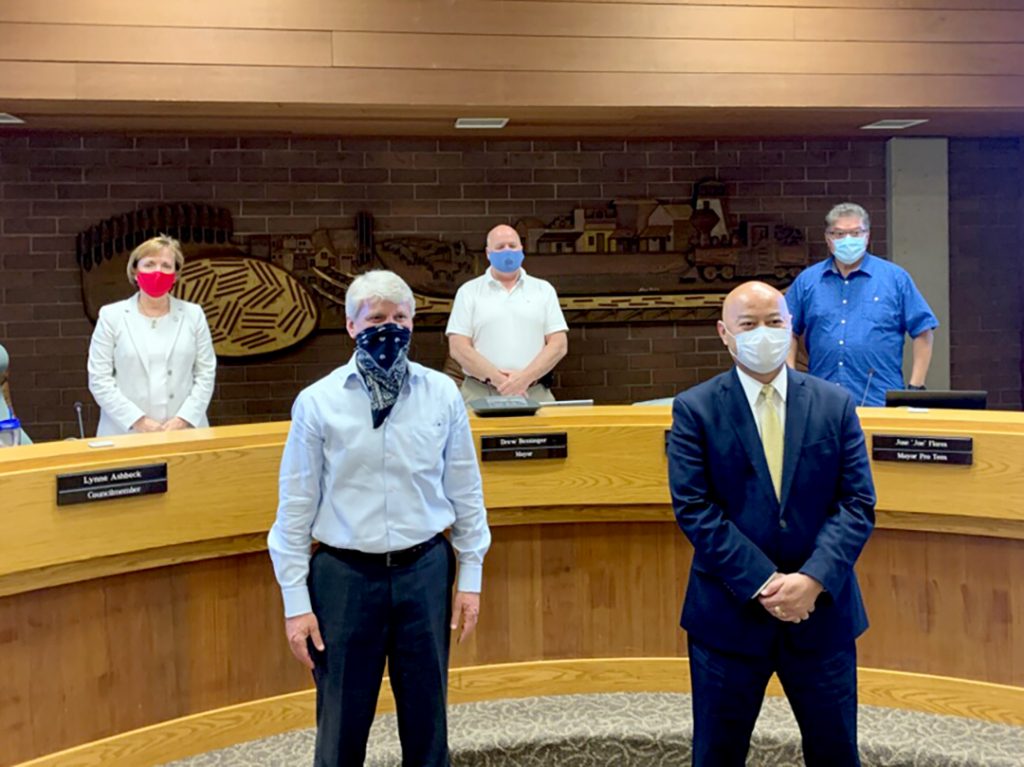
The Clovis City Council received a briefing on the status of COVID-19 in the city on Monday, July 6. City Manager Luke Serpa told the council that, like many communities in the state, cases, infection rates and hospitalization rates have all risen.
“In the last two weeks there was a significant increase in the number of cases with a Clovis address,” Serpa told the council.
Serpa’s message to the council echoed the one made by Governor Gavin Newsom who on Monday, July 6 said during his press conference that the state’s positivity rate, which was “…at a 4.9 percent positivity rate just fourteen days ago,” had now risen to 6.8 percent.
According to Fresno County’s COVID-19 Data and Surveillance Dashboard, there is currently 293 COVID-19 cases in Clovis as of July 8.
The council also held a discussion on the usage of masks in the city. This was the first city council meeting following Gov. Newsom’s mask order, all members of the council wore masks.
“There is no elective body in this state that has agreed on anything, including us, but if we could today agree on simply to wear a mask,” Councilmember Lynne Ashbeck said before asking her fellow council members if they would be willing to take a photograph with masks as a way of encouraging their use in the community.
Councilmember Jose Flores was supportive of masks but spoke passionately about the low death rate and infection rate.
“We have to show leadership on the other side we can’t just roll up into the fetal position and do nothing,” Flores said.
Data available through both the state and Fresno County’s information dashboards show Fresno County’s death rate of 1.2 percent is in line with the state-wide rate. The county’s infection rate of 9.1 percent that Flores referenced is higher than the state’s rate of 6.8 percent, though.
With increasing case numbers combined with higher infection and hospitalization rates, there are fears the economy could be shut down again.
“This [mask wearing] is the only thing we as citizens can do,” Ashbeck said. “We will never have a healthy economy if people aren’t healthy enough to go outside.”
The city council gave approval for Serpa to sign a certification form with the state certifying that the city will comply with federal and state COVID-19 guidelines and restrictions. It’s a move that could allow the city to receive $1.47 million from the CARES Act through the state.
In order to be eligible for that money, the city needs to comply with all orders from the state in regard to COVID-19. Clovis has complied with all orders thus far, Serpa said.
The city must adhere to “federal guidance and the state’s stay-at-home requirements and other health requirements as directed in gubernatorial Executive Order N33-20,” a copy of the form provided in the packet for the July 6 council meeting said. The city must also comply with any future orders that might be sent down by the Governor or state health agencies.
Failure to comply with the orders could lead to the city having to refund the money it receives, but Serpa told the council the chance of that occurring is low, and he urged the council to allow him to sign the form.
The council approved the request unanimously.
There was some positive news in the meeting. The city’s Meals on Wheels program that it started in the early days of the crisis has flourished.
The city has worked with 36 different local restaurants to deliver an average of 150 meals per day to seniors and other at-risk individuals in the community.
With indoor dining no longer an option for restaurants after the state reversed course on reopening, 17 Old Town Clovis restaurants are currently taking advantage of space to have outdoor dining that complies with state orders.
“We are doing everything we can but it is still a huge challenge for our local restaurants and businesses,” Serpa said. He applauded the work of Andy Haussler, the Clovis Economic and Development Director, who, with his staff, has worked with local businesses to reopen safely.
Other local governments are even reaching out to Haussler and his staff for guidance, Serpa told the council.
“I really think our staff is doing an excellent job in outreach and training to tell people how they can adapt,” Mayor Bessinger said.








